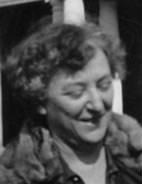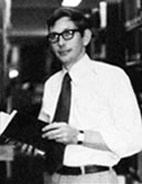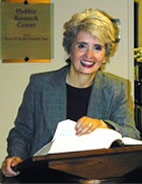Of Places, Spaces, and Random Acts of Heroism
The University's library was first established in 1826 in the gallery of the Rotunda. The original collection of more than 7,500 books, hand-selected by Thomas Jefferson, featured law as its most prominent subject. By 1894, the law collection had been moved to an annex in the Rotunda to make it more accessible to law students. The relocation proved to be fortuitous. During the infamous Rotunda Fire of 1895, most of the library was destroyed, but the law collection's separate location allowed Professor Raleigh C. Minor to heroically save nearly all of it. The subsequent Rotunda redesign included basement space for the law books, which were were housed there until the Law School's 1911 move to Minor Hall. In 1932, the new Clark Hall became home to the Law School and its library. The Law School settled into its current North Grounds home in 1974, when its new library was named for Arthur J. Morris, a law school alumnus (1901) and banker. The library took its current shape during a building renovation that was completed in 1998.
The Establishment of Professional Leadership

A collection of books becomes a modern law library
Along with its five locations the law library has had five library directors. Until Ella Watson Johnson became the first law librarian in 1911, law students, under the direction of the University Librarian, were responsible for the law collection. Ms. Johnson served for just a year in the position when Catherine Lipop assumed the title and stayed until her retirement in 1945. Ms. Lipop created a card catalog and organized the growing collection, but the selection of materials was still largely in the hands of the law faculty.

A top legal research facility emerges
It was not until the arrival of the legendary Frances Farmer that professional traditions of librarianship were established. In his 1941 report to the President of the University, Dean Ribble described many deficiencies within the library, including its need for a professionally trained librarian. Miss Farmer (as she was universally called at the time) held a law degree and had studied law librarianship at Columbia University. During her thirty-one-year tenure as Librarian and Professor of Law, she built collections, fought for library space and championed librarian salaries. Professor Farmer was noted for her aggressive style, yet her single-minded dedication to the library helped place it among the finest legal research libraries in the country.

Reaching out and logging on
At Professor Farmer's retirement, Larry Wenger became the new library director. He came to Virginia in 1976 after spending two years at the Harvard Law School Library and seven years at the State University of New York at Buffalo. Professor Wenger was the first of Virginia's law library directors to hold both an M.L.S. and a J.D. For twenty-six years he built collections, focusing of foreign, international and maritime law. His global search for unique titles greatly enhanced the library's rare book and manuscript collections. He directed the library during its transition to the electronic era, bringing in Lexis and Westlaw and creating its first online library catalog. At the same time, he developed the library's professional staff, adding librarians who specialized in media, government documents, foreign law, and rare books. It was his well-articulated vision that inspired the 1998 renovation of the Law School Library to its current form. Leaving a legacy of excellence in all that he did, Professor Wenger retired from his position of Library Director in 2002.

Opening doors to both the future and the past
Taylor Fitchett served as director of the University of Virginia Law Library from 2000 to 2018. Prior to coming to Virginia she was the director of the law library at the University of Cincinnati's College of Law. Ms. Fitchett earned an M.L.S. from the University of Alabama, where she also served as director of the law library. At Virginia, she focused on optimizing library systems for a digital information society and developing the library's research team to serve the changing landscape of law and legal scholarship. As director, Ms. Fitchett also led efforts to preserve in electronic format the law library's numerous unique collections of historical value, so that they will be readily accessible to future generations of scholars.
